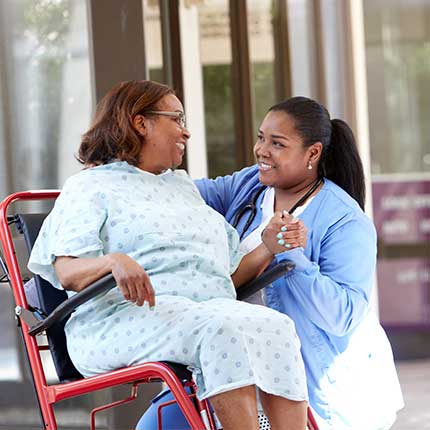Healthy Living: Orthopedics
Concussions vs. Traumatic Brain Injury
Every year, according to the National Institute of Health, millions of people in the U.S. suffer brain injuries. A traumatic brain injury (TBI) occurs from sudden trauma which causes damage to the brain. TBI can happen when the head suddenly and violently hits an object or when an object pierces the skull and enters brain tissue.
A concussion, which is common in physical contact sports, is a form of brain injury. It involves a short loss of normal brain function following a hit to the head or body that causes the head and brain to move rapidly back and forth. Although they are typically not life-threatening, concussions can be serious.
Here are symptoms and treatments for concussions and traumatic brain injuries. If someone you know has hit their head, it’s important to have them evaluated by an emergency room doctor or neurologist to determine the best course of action.
Symptoms of a concussion may not start right away. They can occur days or weeks after the initial impact.
Concussion symptoms include:
Symptoms of a TBI can include:
A concussion, which is common in physical contact sports, is a form of brain injury. It involves a short loss of normal brain function following a hit to the head or body that causes the head and brain to move rapidly back and forth. Although they are typically not life-threatening, concussions can be serious.
Here are symptoms and treatments for concussions and traumatic brain injuries. If someone you know has hit their head, it’s important to have them evaluated by an emergency room doctor or neurologist to determine the best course of action.
Symptoms of a concussion may not start right away. They can occur days or weeks after the initial impact.
Concussion symptoms include:
- Headache or neck pain
- Nausea
- Ringing in the ears
- Dizziness or fatigue
- Feeling dazed or “out of it” and not yourself
- Convulsions or seizures
- Drowsiness or inability to wake up
- A headache that gets worse and doesn’t go away
- Weakness, numbness or decreased coordination
- Repeated vomiting or nausea
- Confusion
- Slurred speech
- Loss of consciousness
Treatment and Diagnosis
Following a physical exam by a doctor, diagnosing a concussion can involve a neurological exam to check vision, balance, coordination and reflexes. They will likely also evaluate the patient’s memory and thinking, and may perform a CT Scan or MRI. This is to help identify signs of bleeding, inflammation or skull fracture. Fortunately, most people recover from a concussion; however, it can take time and rest is very important to allow the brain to heal. Limiting physical activities and activity that requires concentration may also be advised as these can trigger headaches or other concussion symptoms.Symptoms of a TBI can include:
- Headache
- Confusion
- Lightheadedness, dizziness
- Blurred vision or tired eyes
- Ringing in the ears
- Fatigue or lethargy
- Changes in sleep
- Behavioral or mood changes
- Problems with memory, focus, attention or thinking
Treatment for TBI
If a TBI is suspected, the individual should receive immediate medical attention. If brain damage is diagnosed, the goal of doctors is to stabilize the person, insure proper oxygen flow to the brain and the rest of the body, control blood pressure and prevent further injury. Some TBI patients may require surgery to remove or treat ruptured blood vessels, called hematomas, or bruised brain tissue, known as contusions. Surgery can depend on several factors including: the severity of the injury, its location, and the person’s age and overall health. For people with mild or moderate injuries, skull and neck x-rays may be done to check for bone fractures or spinal instability. For moderate to severe injury, imaging is done via CT scan. In February 2018, it was announced that the Food and Drug Administration approved a blood test to evaluate mild traumatic brain injury in adults.Rehabilitative Treatment Programs
Physical therapy, occupational therapy, speech/language therapy, psychology/psychiatry and social support are some of the treatment programs and rehabilitation services that may be needed for moderate to severely injured patients.Sign Up for Health Tips
Learn about upcoming events and health topics such as weight, pain, heart and more.


